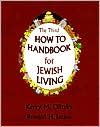

 |

|

The average rating for The Third How-To Handbook for Jewish Living, Vol. 3 based on 2 reviews is 3 stars.
Review # 1 was written on 2015-05-25 00:00:00 Michael Anthony Michael AnthonyI enjoyed this clear presentation of the concept of purity in ancient Judaism. Klawans investigates the matter in the Hebrew Bible, second temple period writings (Jubilees and the Temple Scroll in particular), the Qumran sect, tannaitic writings and Christianity (John the Baptist, Jesus and Paul). He argues that in the Hebrew Bible the notions of purity and sin are actually separate ideas; ritual purity does not entail a state of sinfulness and sin does not cause ritual impurity but rather moral impurity. Whereas ritual purity requires ablutions and other rituals to mitigate it, moral purity requires repentance and has an ability to pollute the temple and even the land to the extent that the prophets argued that God's presence would be forced to leave. In the Qumran sect the idea of ritual purity and sin were intertwined; sin could cause ritual purity and states of ritual impurity could suggest some kind of sin requiring repentance. In tannaitic writings these concepts are kept strictly separate and the halakah dwells on ritual purity (tahor) and impurity (tameh), even requiring that people enter into states of ritual impurity, such as for burying a loved one, clearly indicating that there is nothing inherently sinful about impurity. The concern is keeping ritual impurity at bay and away from holy things (mqadoshim) In the first Christian writings there is yet again innovation as John the Baptist seems to require a purification ritual, baptism, as a part of repentance for moral impurity. Jesus seems to have made a distinction between ritual and moral impurity, as the tannaitic literature, but was far more concerned about moral impurity than maintaining ritual purity. In Paul's writings concern about ritual purity drops off the map altogether. The only complaint that I have is that I would have enjoyed a more in-depth review of the early Christian sources but perhaps that is more appropriately taken up by New Testament scholars. Klawans' treatment sheds light on the ongoing misinterpretation of Judaism by Christianity as Christians continue to conflate the notions of ritual and moral impurity. |
Review # 2 was written on 2018-10-19 00:00:00 Dwohntany Wilder Dwohntany WilderRead for graduate school. Review to come. |
CAN'T FIND WHAT YOU'RE LOOKING FOR? CLICK HERE!!!